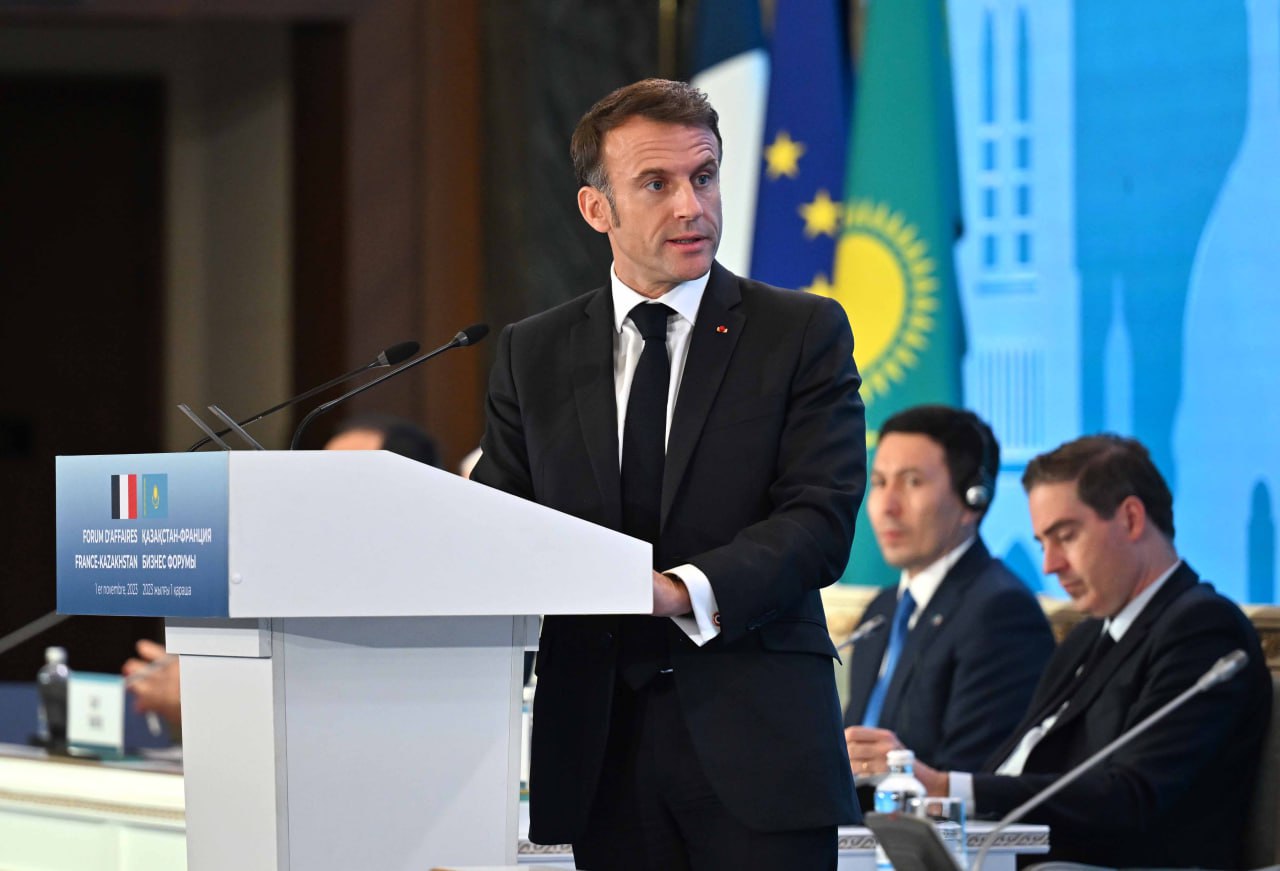
France’s President Macron addresses Kazakh leaders in Astana. Source: Astana Times
President Macron of France and Prime Minister Orbán of Hungary met bilaterally with Central Asian leaders this week to strengthen relations with the countries in the region. President Macron’s visit highlighted the three-decade cooperation France has enjoyed with Kazakhstan. President Tokayev highlighted that Kazakhstan would seek to further energy cooperation with France and the EU, citing that Kazakhstan already fulfills the majority of oil exports to France. He used the meeting with Macron to call for Kazakhstan to gain greater integration into the European Union Global Gateway initiative to hasten the transport of energy and other goods into the EU (Astana Times). Astana and Paris also signed a cooperative agreement to extract strategically important rare earth metals from Kazakhstan via French companies (Astana Times). On November 2, the day after Macron met with Tokayev, Hungary’s Orbán arrived in Astana to discuss further cooperation between his country and Kazakhstan. Orbán traveled to Kazakhstan due to the country’s hosting of the Organization of Turkic States (Newsline). Prior to the meeting, Orbán and Tokayev discussed furthering economic cooperation between their two states. Tokayev proposed the sale of metallurgical products worth $700 million, further oil extraction opportunities for Hungarian companies (Astana Times).
The Organization of Turkic States met in Astana to discuss deepening economic and political cooperation with a common goal of creating regional and global stability amidst a chaotic global situation. In particular, the leaders called for shoring up economic and geopolitical relations between the bloc members Kazakhstan, Kyrgyzstan, Türkiye, Azerbaijan, and the observing members Hungary and Turkmenistan. On the economic front, the leaders called for the modernization of transport links between states and to grow economic ties – especially through the export of energy (Astana Times). President Erdogan of Türkiye further called for the creation of a shared alphabet between member states to be used in academia and to promote people-to-people ties between states (Tashkent Times). The leaders in attendance codified their efforts under the Turkic World Vision 2040 to ensure a shared identity and geopolitical cooperation between the Turkic states over the next few decades (Kazakhstan Today).
A month after district-level elections were first announced in Kazakhstan, voting took place on November 5 across the country to elect 45 akim positions (Astana Times). This election is historic as it is the first time voters are allowed to choose cities’ mayors and provincial heads for positions across the country (Sputnik Kazakhstan). Voting opened early on Sunday at 7:00. Roughly one million Kazakhs were eligible to vote in the election – only those who registered to vote were eligible to vote for the 249 candidates that were in the running for this first, historic election cycle (Astana Times; Kaz Inform).
Kazakhstan, Turkmenistan, Tajikistan, and Uzbekistan met to discuss water-sharing agreements in recognition of the rapid desiccation of the Aral Sea and its main water source: the Syr Darya River. Heads of state from each country laid out water-sharing agreements for the upcoming year to limit further drying of the river due to intensive agricultural practices. The agreement between states ensures that the necessary 487 million cubic meters of water will pass through the Syr Darya River to the Aral Sea; both guaranteeing that agricultural industries will have enough water to operate and that the further drying of what remains of the Aral Sea will be limited (Turkmen Portal). These inter-region water management efforts have been hastened by a statement from the head of the European Development Bank, Nikolay Podguzov, who announced that Central Asia would face intense water shortages by 2029 if no efforts were made to remediate the damage made to water courses throughout the region (24.kg).
Nearly a week after Pakistan’s deadline to deport Afghan refugees back to their country of origin, a massive humanitarian exodus has begun between the borders of Afghanistan and Pakistan. Since the order was declared, about 160,000 refugees have been crossing back into Afghanistan per day, up from about 300 per day prior to November 1 (Afghanistan Times). On the Afghan side of the border, refugees are met with camps that are unable to sustain the large populations now forced to settle therein. As Taliban officials try to collect their biometric data and register their crossing into the country, refugees do not have adequate places to stay (Afghanistan Times). In attempting to manage this situation, the ruling Taliban government has called on Pakistan to ensure that adequate preparations are made before the transfer of Afghanistani citizens, including the protection of personal safety, food, and business interests in their country of origin (Bakhtar News Agency). At the same time, Afghanistan and Pakistan are trying to broker a deal to transfer the $3 billion worth of Afghani-held assets into Pakistan, though these efforts are slow and the migrant crisis on the border grows more dire each day (Tolo News).

